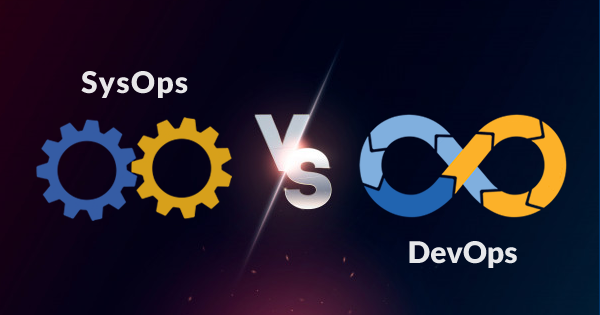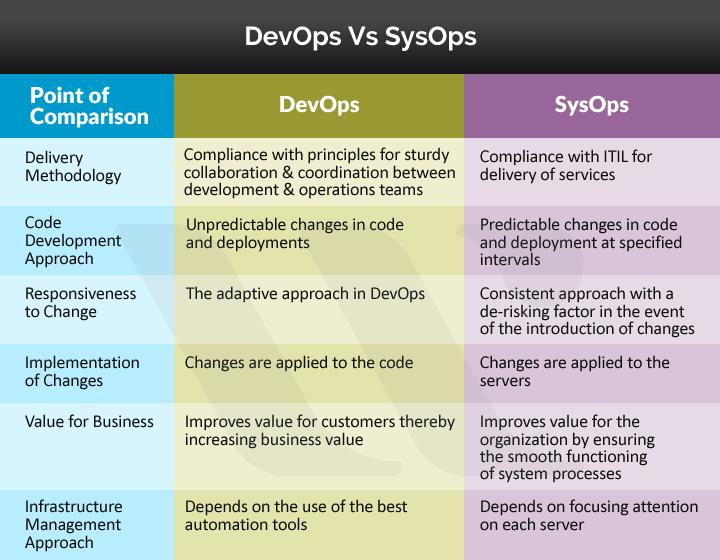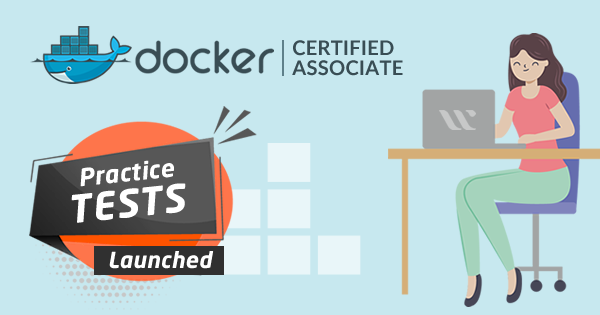The advancements in technology are very crucial for changing the IT landscape as we know it today. Cloud computing has been a crucial technological improvement that presents excellent potential for the future. As many new technologies make an entry in the cloud computing sector, the discussion on SysOps vs DevOps is becoming popular.
SysOps or System Operations and DevOps or Development Operations are widely used terms in cloud computing. Therefore, the increasing attention of many people on the differences between these two terms is reasonable. Candidates involved in cloud computing require a comprehensive understanding of these terms.
With the increasing demand for SysOps and DevOps certification, developers, and administration personnel in the IT sector require more than superficial awareness about these two terms. Therefore, the following discussion would outline the difference between SysOps and DevOps according to different criteria. Furthermore, the discussion would also receive the support of introductory insights into DevOps and SysOps with a brief representation of tasks involved with them.
Understanding the Terms: SysOps and DevOps
In the past, business owners had to hire various employees to perform different activities. The notable job roles which were prominent long before the existing debate on SysOps vs DevOps include developers, testers, database administrators (DBAs), system engineers, operators, and network engineers. The list did not end with these mentions and continued further with many other job roles.
However, as cloud computing rose to prominence, these job roles started becoming simpler. Cloud computing improved the ease of a DBA’s task by 20%, a system admin’s task by 50%, and a network engineer’s task by 80%. Therefore, the system administrators now have additional time at their disposal with the reduction in tasks under their responsibility.
Therefore, system administrators could now focus on supporting developers in the process of building applications rather than on the developer’s mistakes. As a result, DevOps came into existence. At the same time, SysOps also found recognition due to the need for businesses to align with certain standards. A further explanation of definitions of the two terms could improve our understanding of the difference between SysOps and DevOps.
What is DevOps?
DevOps is one of the profound terminologies you would find the current world of cloud computing. The popularity of DevOps could also be a reason for the increasing emphasis on the SysOps vs DevOps battle. DevOps shows what it is from its name and is a very crucial concept that supports the management of development and operations tasks together.
The complete focus of DevOps is on tasks such as development, testing, integration, and monitoring. DevOps involves the use of opensource and cross-platform tools like Chef and Puppet for delivering system configuration and automation. So, on the one hand, system administrators deal with infrastructure building tasks in DevOps. On the other, developers have to address the concerns of continuous deployment through automation of build tools.
DevOps domain is on rise with benefits for organizations and new opportunities for professionals. Here’re the reasons why you should learn DevOps!
What is SysOps?
SysOps is also a prominent contender in the SysOps vs DevOps debate. It is completely different from DevOps despite a few similarities. SysOps generally deals with the administration of multi-user systems. The traditional role of a SysOps professional involved the management of a specific computer system. However, the existing role of SysOps professionals focuses on forming a benchmark for an organization to design, execute, and monitor an application.
The work of SysOps administrators generally involves monitoring and justifying the right cloud services and best practices. The formidable difference between DevOps and SysOps is that the latter is a classic approach that supports monitoring, management, and operation of infrastructure systems. The work of SysOps is also evident in the troubleshooting of issues emerging during operations.
Differences between SysOps and DevOps i.e. SysOps vs DevOps
Both of these terms are considered crucial interventions in conventional approaches for system infrastructure design. As a result, you can find various similarities between them, especially in terms of functionality. However, certain differences tend to go unnoticed in the SysOps vs DevOps battle. Let us reflect on the specific areas of differences between SysOps and DevOps that find prominent mention commonly.
1. Delivery Methodology
The first point of comparison is the delivery methodology. The delivery methodology signifies the principles underlying the implementation of SysOps and DevOps. In the case of DevOps, delivery relies prominently on establishing formidable coordination between the development and operations teams. The delivery model in DevOps also focuses on reliable collaboration and communication between the development and operations teams.
On the other hand, SysOps relies on the ITIL (Information Technology Infrastructure Library) approach. The ITIL approach focuses heavily on a collection of strict guidelines for the delivery of IT service management (ITSM) functionalities. The primary focus of SysOps, therefore, is highly dedicated to the alignment of business objectives with IT services.
2. Code Development Approach
The next point of comparison for the difference between DevOps and SysOps is the approach for code development. In the case of DevOps, the collaboration between the developer and operations team plays a crucial role in code development. The collaboration implies precedents for proactive identification and implementation of changes in the application for developer and operations teams.
There is no specific approach in DevOps for deployments or introducing modifications in a particular application. Therefore, you are more likely to encounter an unpredictable rate of code change in DevOps. However, SysOps tends to be the opposite of its competitor in the SysOps vs DevOps conflict in this case. SysOps professionals support the developer team with a consistent approach for deployments and modifications in code.
The increasing demand of DevOps professionals makes candidates choose DevOps career. Here are the 10 things to know before starting DevOps career
3. Responsiveness to Change
The third point of difference in the SysOps vs DevOps comparison relates to responsiveness for change. The basic principle of DevOps validates an adaptive approach to any spontaneous changes in the code. The capability of DevOps to adapt to spontaneous change is possible due to its requirements for responsiveness to change. DevOps requires effective consensus between the development and operations teams on the measures for addressing a specific change.
On the other hand, the SysOps approach towards change in the code is reactive. The SysOps approach focuses on continuing IT services without any risks, thereby indicating the need for proactive risk management. As a result, the SysOps approach does not provide flexibility for changes. While on the discussion about differences between SysOps and DevOps based on responsiveness to change, another difference is crucial. In the case of DevOps, the user initiates changes, while the Change Board is responsible for initiating changes in SysOps.
4. Implementation of Changes
Another important point of comparison that often arises in discussions on AWS SysOps vs DevOps refers to the application of changes. In the case of SysOps, the application of changes occurs at the servers. The SysOps teams implement the required changes on the servers. On the other hand, you can find that DevOps implies the application of changes to the code. Therefore, while SysOps teams focus their work on servers, DevOps teams work with the code in their minds. As a result, we can note the difference in AWS SysOps vs DevOps in terms of applying changes in code.
5. Value for the Business
The final aspect that you can find in general comparisons of AWS DevOps vs SysOps refers to a value. A clear evaluation of the value derived from SysOps and DevOps can help in strengthening this discussion further. SysOps approach is ideally meant for ensuring the proper functioning of system processes within an organization. Therefore, SysOps provides the value of smoother functioning of the organizational IT infrastructure.
On the other hand, the DevOps approach involves a formidable focus on the aims of the organization. Therefore, we can note that DevOps can provide exceptional business value to an organization. So, it is clear that AWS DevOps vs SysOps differ in terms of the focus of DevOps on business value and that of SysOps on well-orchestrated system functioning.
6. Infrastructure Management
Another notable mention among the differences in SysOps vs DevOps comparison refers to an approach for infrastructure management. In the case of SysOps and DevOps, the focus of infrastructure management is centralized around infrastructure. However, the difference arises in the fact that SysOps focuses on paying individual attention to each server in a user’s account. On the other hand, the DevOps approach focuses on infrastructure management through the use of best-in-class automation tools. As one of the benefits of DevOps, it enables the management of infrastructure by managing servers as code in functional groups through templates.
All these aspects form the basic foundation for any discussion on differences between DevOps and SysOps. The understanding of these differences can provide clarity regarding the choice of the right approach for infrastructure development and management. Furthermore, IT professionals could also find relevant career opportunities in each field and decide the one suitable for their capabilities.
Final Words
On a final note, every business tends to face a tough decision when it comes to SysOps vs DevOps. Therefore, a clear impression of the essential factors that a business must consider before making a final choice becomes mandatory. First of all, businesses should focus on their needs for speed of execution as their foremost priority. Businesses should also focus on the significance of predictions and determining the traffic rate of an application.
Furthermore, businesses should also determine the instances when traffic increases or falls drastically. Also, businesses should know about the speed of scaling according to changes in traffic. Most important of all, a business should understand the frequency of performing releases to the application before making a final choice.
If you are a cloud professional in SysOps or DevOps and preparing for certification to validate your skills, we recommend you to check out our Cloud Certification Training Courses. We offer best-in-industry training and practice material. So, enroll now and get ahead for a successful career!
- Top 10 Highest Paying Cloud Certifications in 2024 - March 1, 2023
- 12 AWS Certifications – Which One Should I Choose? - February 22, 2023
- 11 Kubernetes Security Best Practices you should follow in 2024 - May 30, 2022
- How to run Kubernetes on AWS – A detailed Guide! - May 30, 2022
- Free questions on CompTIA Network+ (N10-008) Certification Exam - April 13, 2022
- 30 Free Questions on Microsoft Azure AI Fundamentals (AI-900) - March 25, 2022
- How to Integrate Jenkins with GitHub? - March 22, 2022
- How to Create CI/CD Pipeline Inside Jenkins ? - March 22, 2022






Thanks for sharing, it was informative. We play a small role in upskilling people providing the latest tech courses. Join us to upgrade on AWS DevOps Training